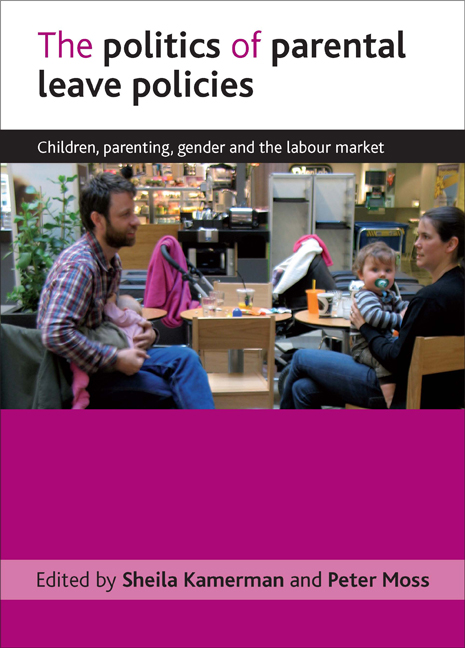Book contents
- Frontmatter
- Contents
- List of tables and figures
- Acknowledgements
- Notes on contributors
- one Introduction
- two Australia: the difficult birth of paid maternity leave
- three Canada and Québec: two policies, one country
- four Czech Republic: normative or choice-oriented system?
- five Estonia: halfway from the Soviet Union to the Nordic countries
- six Finland: negotiating tripartite compromises
- seven France: gender equality a pipe dream?
- eight Germany: taking a Nordic turn?
- nine Hungary and Slovenia: long leave or short?
- ten Iceland: from reluctance to fast-track engineering
- eleven The Netherlands: bridging labour and care
- twelve Norway: the making of the father’s quota
- thirteen Portugal and Spain: two pathways in Southern Europe
- fourteen Sweden: individualisation or free choice in parental leave?
- fifteen The European directive: making supra-national parental leave policy
- sixteen Conclusion
- Appendix
- Index
three - Canada and Québec: two policies, one country
Published online by Cambridge University Press: 05 July 2022
- Frontmatter
- Contents
- List of tables and figures
- Acknowledgements
- Notes on contributors
- one Introduction
- two Australia: the difficult birth of paid maternity leave
- three Canada and Québec: two policies, one country
- four Czech Republic: normative or choice-oriented system?
- five Estonia: halfway from the Soviet Union to the Nordic countries
- six Finland: negotiating tripartite compromises
- seven France: gender equality a pipe dream?
- eight Germany: taking a Nordic turn?
- nine Hungary and Slovenia: long leave or short?
- ten Iceland: from reluctance to fast-track engineering
- eleven The Netherlands: bridging labour and care
- twelve Norway: the making of the father’s quota
- thirteen Portugal and Spain: two pathways in Southern Europe
- fourteen Sweden: individualisation or free choice in parental leave?
- fifteen The European directive: making supra-national parental leave policy
- sixteen Conclusion
- Appendix
- Index
Summary
Maternity leave: Québec – 18 weeks at 70% of earnings or 15 weeks at 75% of earnings, both with an earnings ceiling of CAN$60,500 (€37,665) per year. Rest of Canada – 15 weeks at 55% of earnings, with an earnings ceiling of CAN$41,100 (€25,585), but no payment for the first 2 weeks of leave.
Paternity leave: Québec – 5 weeks at 70% of earnings or 3 weeks at 75% of earnings, both with an earnings ceiling of CAN$60,500 (€37,665). Rest of Canada – none.
Parental leave: Québec – 32 weeks, 7 weeks at 70% of average earnings and 25 weeks at 55%, or 25 weeks at 75% of earnings, both with an earnings ceiling of CAN$60,500 (€37,665). Rest of Canada – 35 weeks at 55% of earnings with an earnings ceiling of CAN$41,100 (€25,585).
A ‘Family Supplement’, increasing wage replacement to 80% for all types of leave, is available throughout Canada for low-income families with a net annual income of less than CAN$25,921 (€16,135).
Leave to care for sick children: Québec – 10 days per year unpaid for the health or education of one's child or partner's child. Rest of Canada – provinces of British Columbia and New Brunswick allow 3 to 5 days of unpaid leave a year to care for immediate family members.
Other: none.
Canada is a federal state, with marked differences in leave policy between one province, Québec, and the rest of Canada. These include flexibility and level of payment, but also eligibility (see below). Nationwide, a quarter of mothers are not eligible for leave. In 2006, 56% of fathers in Québec took a period of leave. This mainly accounted for an increase across Canada in fathers taking leave, rising to 20% in 2006. Just over half of all mothers (51%) take 12 months or more of leave, compared with only 4% of fathers.
Introduction
Within 3 miles of each other, two distinct policy regimes influence the first year of parenting in 2 Canadian families. On one side of the Ottawa River, in the city of Ottawa in the province of Ontario, Bill and Sarah Rogers welcomed their baby daughter Naomi 14 months ago. Sarah took 15 weeks’ maternity leave and most of the 33 weeks of parental leave (both at 55% of earnings); this is partly because she is breastfeeding and partly because Bill is the higher income earner and they need his full earnings.
- Type
- Chapter
- Information
- The Politics of Parental Leave PoliciesChildren, Parenting, Gender and the Labour Market, pp. 33 - 50Publisher: Bristol University PressPrint publication year: 2009



